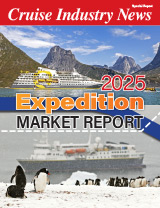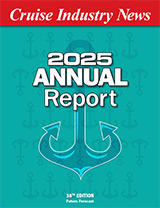“We set (fuel-savings) targets on corporate and group levels,” said Tom Strang, senior vice president of marine operations for Costa Crociere. “We have targets for this year and longer term through 2017. We also have targets set for each ship and for each itinerary. There is a team dedicated to fuel savings.”
Strang explained that setting targets also involved investing in technology to reach those targets and being able to measure the results. Being a naval architect by profession, Strang said he goes by the advice of one of his previous professors, who said: “If you cannot measure it, you cannot improve upon it.”
In order to reduce fuel consumption, Costa focused first on itinerary planning and slowing the ships down. Strang said this saves fuel immediately and is essentially free. But to continue from there, a more robust set of processes is needed.
The company has recently concentrated on its propulsion and has achieved further savings on the hotel side.
“We are developing measurement tools and looking at the galley and laundry. Can we find a more optimum way of using our energy? Can we spread it out more evenly so we do not run the galley and laundry at full capacity while we are on a relatively high-speed segment of an itinerary? There are many things we are looking at.”
Strang said that installing LED lighting offers huge benefits, because not only do they use less power, but also because they generate less heat, thus reducing the need for air conditioning.
Another focus is on HVAC, the largest power consumer on the hotel side. But thanks to improvements introduced recently, Cost has been able to reduce its power need by 3 MW.
The new Costa Diadema, being completed at Fincantieri and slated for delivery later this year, will feature 90 percent of the new, proven fuel-saving technology, according to Strang, and is expected to be up to 30 percent more efficient than the other ships in the fleet.
He said a lot of attention has been paid to automation processes, air conditioning and lighting.
Ultimately, energy and fuel savings come down to crew training. Said Strang: “This is a people-based industry. It is important to invest in people and to train them in all areas, so they in turn can operate our ships at maximum efficiency. I am talking about procedures and processes for energy usage and waste management.
>> Also in this section: Operations coverage include hotel and marine teams sharing the latest at MSC Cruises, and technical updates to the Disney Magic.
Excerpt from Cruise Industry News Quarterly Magazine: Spring 2014



